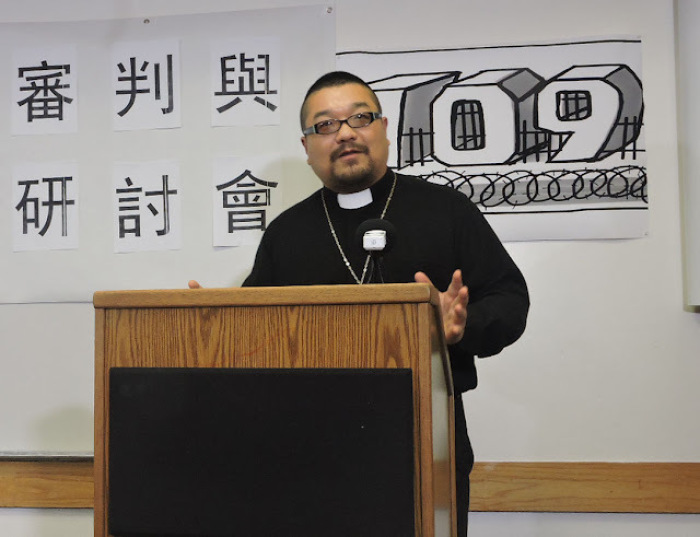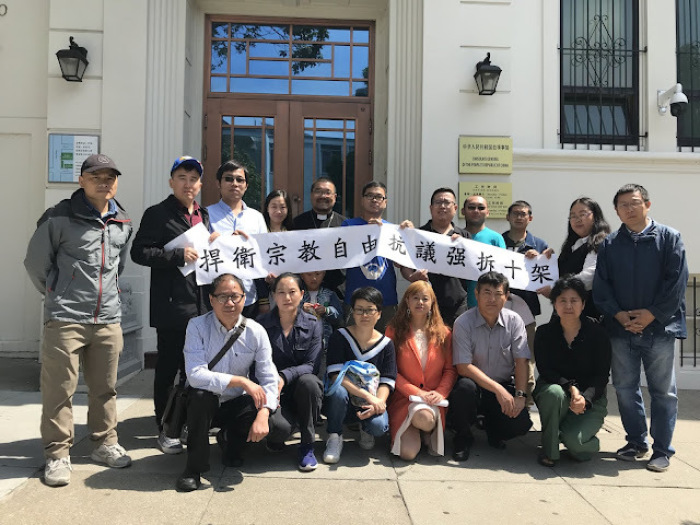Chinese pastor blacklisted by Communist Party warns Church: 'Don't be fooled' by lies of state-sponsored church

This article is part 6 of The Christian Post's series on China's human rights abuses under the spotlight of the Olympic Games and features the testimonies of Christians and religious minorities who were persecuted under the communist regime. Read part 1, part 2, part 3, part 4, part 5 and part 7.
For as long as the Rev. Fr. Jonathan Liu can remember, his family has adhered to Christianity. Both of his parents came from well-established Christian families; in fact, his mother’s great-grandfather believed in the Lord as early as the Qing Dynasty, the final imperial dynasty in China.
After he was baptized in a Three-Self church, the church vetted by the Chinese Communist Party, in Shanghai in August 1990, it felt natural for Liu to enter the ministry. But something about the way Christianity was presented in the Three-Self church began to ring hollow for him.
“As a Christian in mainland China, if you only worship in an official church, you generally don’t feel much pressure, but the official church will always follow the party, and the pastor will sing praises for the CCP’s policies in his sermons, intentionally or not,” Liu told The Christian Post. “This is unsatisfactory for many believers who seek the truth of their beliefs.”
Eager to know more about the God of the Bible and a Christianity free from political propaganda, Liu began studying the Bible in private. He attended “family meetings," private gatherings of Christians who would pray, sing and study the Bible away from the watchful eye of the CCP.
The repercussions, however, were swift: Because he attended a family meeting, Liu was rejected by the Shanghai Christian Council when he attempted to apply for seminary at East China Theological Seminary. The school is located in Shanghai and managed by the official Three-Self Church.
Undeterred, Liu traveled to Ningbo, Zhejiang — a province with a relatively strong Christian presence — where he studied theology and served in a local church. Meanwhile, his home in Shanghai was regularly monitored by the household registration police, suspicious of his religious activity.
“According to my parents and neighbors, they often came to investigate and asked them to report my whereabouts,” he recalled.
Still, Liu served in Three-Self churches for 14 years before finally leaving the denomination in 2004, serving underground house churches in Shanghai, Anhui province, Jiangsu province and Zhejiang province. In 2008, he decided to move to the United States part time, spending half of the year in Shanghai, leading a small church of about 20 people.
Slowly but surely, the pastor began facing increasing harassment from the CCP because of his ministerial work. In 2014, the Shanghai police came to his door in the name of checking household registration.
“I thought it was just a routine business,” he recalled.
But shortly thereafter, he discovered he’d been blacklisted by the CCP and was being watched by government officials.
“When the books I purchased in China were to be mailed to the United States, they were returned by the shipping company on the grounds that there were prohibited books. In fact, all the books I purchased were published in mainland China, and they could not be banned books,” he said.
“Later, after inquiring from various parties, I learned that the reason why my items were intercepted by the customs was that I had been included in the ‘blacklist’ … I have been blacklisted, which may be relatively minor, and will not restrict entry and exit, but will be strictly monitored. Once restricted from leaving the country, for me, there is almost no possibility of escaping from China.”
That same year, Zhejiang officials, under the direction of President Xi Jinping, launched a campaign to forcibly demolish the crosses of Protestant and Roman Catholic churches in the name of “three demolition and one reform” beautification campaign.
In just a few months, officials had removed more than 1,200 crosses from churches and other buildings. In some cases, entire church buildings were destroyed. Those who resisted faced physical abuse, detention and criminal charges.
“Because I have worked in the Zhejiang church for about 10 years, I was very concerned about the situation in Zhejiang,” Liu said. “At that time, I kept posting photos of the demolition of crosses in Zhejiang on Sina Weibo (China's version of Twitter), calling on everyone to pay attention to this matter and pray for it. I was harassed many times by the police in Shanghai, and even a brother in our church was implicated. He was then forced to flee to the United States.”
The continued harassment from officials, coupled with his status as a “blacklisted” Chinese citizen, prompted Liu to officially leave China. In late 2014, he immigrated to the U.S., becoming a permanent resident. He began pastoring an Anglican church in San Jose, yet remained concerned about human rights and religious freedom issues in his homeland.
Two years after establishing permanent residence in the U.S., Liu launched the Chinese Christian Fellowship of Righteousness, a fellowship of Chinese Christians who gather to pray for believers in mainland China and raise awareness about those persecuted. In 2018, the group was registered as a nonprofit religious organization with California’s state government.

China is identified by the U.S. State Department as a “country of particular concern” for engaging in egregious religious freedom violations. The country is ranked No. 17 on Open Doors’ World Watch List of 50 countries where it’s most difficult to be a Christian. “Communist and post-communist oppression” is cited as the main source of persecution.
“Church attendance is rigorously monitored, and many churches are being closed down — whether they are independent or belong to the Three-Self Patriotic Movement. …The old truth that churches will only be perceived as being a threat if they become too large, too political or invite foreign guests, is an unreliable guideline,” Open Doors' latest report notes.
According to Liu, the Chinese government's persecution of churches can be divided into two aspects: The first, he said, is to strictly control the official church.
“For example, the official church is required to absolutely accept the leadership of the CCP, and the preaching of the pastor in the church must be in accordance with the will of the CCP, preaching such remarks as patriotism, Xi Jinping’s core socialist values, and the sinicization of Christianity,” he explained. “Pastors and preachers who are unwilling to preach in this way should stop their evangelistic qualifications; in order to prevent ‘religious overheating,’ they willfully demolish crosses and other acts.”
The second, perhaps more sinister aspect, he said, is for house churches that do not accept government management, the persecution is even more severe.
“The meeting points are directly closed and the preachers are arrested,” he said, reflecting on the pastors he knows personally who have been arrested for their beliefs.
Based on his experiences, Liu said he’s concerned not just for the Chinese Church but for Western churches fooled by the false beliefs promoted by China's state-sponsored church. He called on Western Christians to pray for their persecuted brothers and sisters and remain informed about the human rights situation in China.
“Prayer is always the best support, for the power of the prayers of the righteous is great. I have been calling on Christians in the West to pray for Christians in mainland China,” he said.
“In addition, Western Christians should also be vigilant and not be fooled by the United Front of China's official church. Although there are a large number of Christian churches open in China, these are organizations that are absolutely controlled by the government. The official church is even an accomplice to the government's persecution of house churches.”
Leah M. Klett is a reporter for The Christian Post. She can be reached at: [email protected]



























